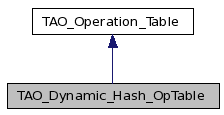
#include <Operation_Table_Dynamic_Hash.h>
Inheritance diagram for TAO_Dynamic_Hash_OpTable:


Public Member Functions | |
| TAO_Dynamic_Hash_OpTable (const TAO_operation_db_entry *db, CORBA::ULong dbsize, CORBA::ULong hashtblsize, ACE_Allocator *alloc) | |
| ~TAO_Dynamic_Hash_OpTable (void) | |
| Destructor. | |
| virtual int | bind (const char *opname, const TAO::Operation_Skeletons skel_ptr) |
| See the documentation in the base class for details. | |
| virtual int | find (const char *opname, TAO_Skeleton &skelfunc, const unsigned int length=0) |
| virtual int | find (const char *opname, TAO_Collocated_Skeleton &skelfunc, TAO::Collocation_Strategy s, const unsigned int length=0) |
Private Types | |
| typedef ACE_Hash_Map_Manager_Ex< const char *, TAO::Operation_Skeletons, ACE_Hash< const char * >, ACE_Equal_To< const char * >, ACE_Null_Mutex > | OP_MAP_MANAGER |
Private Attributes | |
| OP_MAP_MANAGER | hash_ |
| The hash table data structure. | |
Definition at line 36 of file Operation_Table_Dynamic_Hash.h.
typedef ACE_Hash_Map_Manager_Ex<const char *, TAO::Operation_Skeletons, ACE_Hash<const char *>, ACE_Equal_To<const char *>, ACE_Null_Mutex> TAO_Dynamic_Hash_OpTable::OP_MAP_MANAGER [private] |
Definition at line 75 of file Operation_Table_Dynamic_Hash.h.
| TAO_BEGIN_VERSIONED_NAMESPACE_DECL TAO_Dynamic_Hash_OpTable::TAO_Dynamic_Hash_OpTable | ( | const TAO_operation_db_entry * | db, | |
| CORBA::ULong | dbsize, | |||
| CORBA::ULong | hashtblsize, | |||
| ACE_Allocator * | alloc | |||
| ) |
Initialize the dynamic hash operation table with a database of operation names. The hash table size may be different from the size of the database. Hence we use the third argument to specify the size of the internal hash table. The <alloc> argument is used to determine where the memory comes from (usually from <ACE_Static_Allocator_Base>).
Definition at line 35 of file Operation_Table_Dynamic_Hash.cpp.
References ACE_ERROR, ACE_TEXT(), TAO_operation_db_entry::direct_skel_ptr, LM_ERROR, TAO_operation_db_entry::opname, and TAO_operation_db_entry::skel_ptr.
00040 : hash_ (hashtblsize, alloc) 00041 { 00042 // Iterate thru each entry in the database and bind the operation 00043 // name to its corresponding skeleton. 00044 for (CORBA::ULong i = 0; i < dbsize; ++i) 00045 { 00046 TAO::Operation_Skeletons s; 00047 s.skel_ptr = db[i].skel_ptr; 00048 s.thruPOA_skel_ptr = db[i].skel_ptr; 00049 s.direct_skel_ptr = db[i].direct_skel_ptr; 00050 00051 // @@ (ASG): what happens if bind fails ??? 00052 if (this->bind (db[i].opname, s) == -1) 00053 ACE_ERROR ((LM_ERROR, 00054 ACE_TEXT ("(%P|%t) %p\n"), 00055 ACE_TEXT ("bind failed"))); 00056 } 00057 }
| TAO_Dynamic_Hash_OpTable::~TAO_Dynamic_Hash_OpTable | ( | void | ) |
Destructor.
Definition at line 59 of file Operation_Table_Dynamic_Hash.cpp.
References CORBA::string_free().
00060 { 00061 // Initialize an iterator. We need to go thru each entry and free 00062 // up storage allocated to hold the external ids. In this case, 00063 // these are strings. 00064 OP_MAP_MANAGER::ITERATOR iterator (this->hash_); 00065 00066 for (OP_MAP_MANAGER::ENTRY *entry = 0; 00067 iterator.next (entry) != 0; 00068 iterator.advance ()) 00069 { 00070 // We had allocated memory and stored the string. So we free the 00071 // memory. 00072 CORBA::string_free ((char *) entry->ext_id_); 00073 entry->ext_id_ = 0; 00074 } 00075 }
| int TAO_Dynamic_Hash_OpTable::bind | ( | const char * | opname, | |
| const TAO::Operation_Skeletons | skel_ptr | |||
| ) | [virtual] |
See the documentation in the base class for details.
Implements TAO_Operation_Table.
Definition at line 78 of file Operation_Table_Dynamic_Hash.cpp.
References ACE_Hash_Map_Manager_Ex< EXT_ID, INT_ID, HASH_KEY, COMPARE_KEYS, ACE_LOCK >::bind(), hash_, and CORBA::string_dup().
00080 { 00081 return this->hash_.bind (CORBA::string_dup (opname), 00082 skel_ptr); 00083 }
| int TAO_Dynamic_Hash_OpTable::find | ( | const char * | opname, | |
| TAO_Collocated_Skeleton & | skelfunc, | |||
| TAO::Collocation_Strategy | s, | |||
| const unsigned int | length = 0 | |||
| ) | [virtual] |
Uses opname to look up the collocated skeleton function and pass it back in skelfunc. Returns non-negative integer on success, or -1 on failure.
Implements TAO_Operation_Table.
Definition at line 106 of file Operation_Table_Dynamic_Hash.cpp.
References ACE_FUNCTION_TIMEPROBE, ACE_Hash_Map_Manager_Ex< EXT_ID, INT_ID, HASH_KEY, COMPARE_KEYS, ACE_LOCK >::find(), hash_, and TAO::TAO_CS_DIRECT_STRATEGY.
00110 { 00111 ACE_FUNCTION_TIMEPROBE (TAO_DYNAMIC_HASH_OPTABLE_FIND_START); 00112 00113 TAO::Operation_Skeletons skel; 00114 00115 int retval = 00116 this->hash_.find ((const char *)opname, skel); 00117 00118 if (retval != -1) 00119 { 00120 switch (s) 00121 { 00122 case TAO::TAO_CS_DIRECT_STRATEGY: 00123 skel_ptr = skel.direct_skel_ptr; 00124 break; 00125 default: 00126 return -1; 00127 } 00128 } 00129 00130 return retval; 00131 }
| int TAO_Dynamic_Hash_OpTable::find | ( | const char * | opname, | |
| TAO_Skeleton & | skelfunc, | |||
| const unsigned int | length = 0 | |||
| ) | [virtual] |
Uses opname to look up the skeleton function and pass it back in skelfunc. Returns non-negative integer on success, or -1 on failure.
Implements TAO_Operation_Table.
Definition at line 86 of file Operation_Table_Dynamic_Hash.cpp.
References ACE_FUNCTION_TIMEPROBE, ACE_Hash_Map_Manager_Ex< EXT_ID, INT_ID, HASH_KEY, COMPARE_KEYS, ACE_LOCK >::find(), and hash_.
00089 { 00090 ACE_FUNCTION_TIMEPROBE (TAO_DYNAMIC_HASH_OPTABLE_FIND_START); 00091 TAO::Operation_Skeletons s; 00092 00093 int retval = 00094 this->hash_.find ((const char *)opname, 00095 s); 00096 00097 if (retval != -1) 00098 { 00099 skel_ptr = s.skel_ptr; 00100 } 00101 00102 return retval; 00103 }
 1.4.7
1.4.7